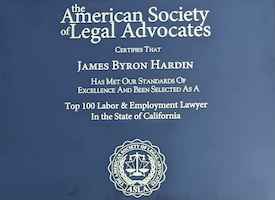We'll Fight for Your Job.
Los Angeles Wage & Hour Lawyers
Experienced Employment Attorney Holding Employers in Los Angeles and Orange County Accountable for Overtime and FLSA Violations
Employers have a legal obligation to pay workers a fair wage for the hours they work. While this sounds straightforward, employers regularly rely on various tactics to deprive workers of their earnings. However, it’s not always crystal clear when an employer is violating state or federal wage and hour laws. For example, asking employees to perform work-related tasks while “off the clock,” failing to pay workers for rest and meal breaks, and denying overtime pay are all common forms of wage and hour violations in Los Angeles.
At the Hardin Law Group, our Orange County and Los Angeles wage and hour violation attorney has more than 25 years of hands-on experience holding employers accountable for all types of wage and hour violations. We command an impressive understanding of the state and federal employment laws and can help you obtain the wages you rightfully earned.
Types of Wage & Hour Violations in LA and Orange County
There are several wage and hour laws that are often violated by California employers, and at the Hardin Law Group, we have the legal understanding, experience, and track record to handle even the most complex cases.
Here is a breakdown of the most common areas of wage and hour violations:
Overtime Violations
California’s overtime laws are designed to ensure fair compensation for employees who work longer than the standard workweek. Under California law, the standard workweek is defined as 40 hours, and the standard workday is 8 hours. Employees must be paid overtime wages anytime they work over eight hours a day or more than six days a week. Overtime compensation may be either 1.5x or 2x the employee’s base wage, as follows:
- 1.5 times an employee’s regular wage is paid for hours worked over 8 hours up to 12 hours in a single workday and for the first 8 hours worked on the seventh consecutive day of work in a workweek.
- Two times, an employee’s regular wage is paid for hours worked over 12 hours in any workday and for all hours worked over 8 hours on the seventh consecutive day of work in a workweek.
Note that California overtime laws only apply to non-exempt workers. Thus, employees in administrative, professional, or executive positions may be considered exempt. If you have questions about whether you are entitled to overtime pay, reach out to a Los Angeles employment lawyer for assistance, as these laws are complex.
Meal & Rest Break Violations
Nonexempt employees are entitled to meal and rest periods throughout the day. The more hours an employee works during a day, the more meal and rest periods the employer must provide. Your employer is obligated under state law to communicate the legal requirements of California’s employee break laws and provide you with opportunities to take meal and rest breaks.
A California employee who works a five-hour shift should receive an unpaid, off-duty meal period of at least 30 minutes. Additionally, employers must provide a second meal break at least 30 minutes long for all workdays on which an employee works more than 10 hours.
Additionally, a nonexempt employee who works at least 3.5 hours in one day is entitled to a mandatory rest break of 30 minutes.
Employers cannot dictate what an employee does on their meal or rest break. For example, if an employer demands an employee perform work-related tasks on a designated break, this should not count as the employee’s break.
Reimbursement & Unpaid Work Expenses
Employers must reimburse their employees for all necessary work-related expenses, including mileage costs, smartphones used for work purposes, and work equipment. Importantly, an employer’s obligation to reimburse an employee is not dependent on the employee’s request for reimbursement – employers should offer reimbursement even in the absence of an employee bringing it up.
Minimum Wage Violations
In California, the minimum wage is $12 per hour. However, some cities set a higher minimum wage. Under federal employment law, the minimum wage is $7.25. Many employers try to get around paying employees the higher California minimum wage or paying employees the state wage rather than a higher city wage. Typically, employers do this by paying employees a “salary” that averages out to be less than the minimum wage per hour.
Has Your Employer Violated Your Right to a Fair Wage?
If you believe that your employer has committed wage and hour violations and refused to pay you the wages or breaks you are entitled to, you may be able to bring a claim for a wage and hour violation. At the Hardin Law Group, Attorney James Hardin has extensive experience investigating claims of wage and hour violations. As a skilled negotiator, Attorney Hardin is often able to obtain fair settlements for his clients’ cases without the need for a trial by presenting compelling evidence of an employer’s violation. However, Attorney Hardin is also ready to rely on his 25+ years of litigation experience and take your case to trial if your employer is unwilling to offer a fair resolution. To learn more, and to schedule a free consultation today, call out Los Angeles wage and hour violations attorney at 310-606-2122. You can also connect with our Orange County employment attorney by calling 949-337-4810.





















